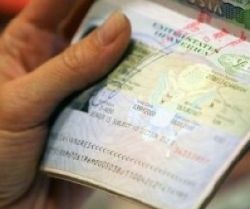
TBILISI, DFWatch–The prospect for Georgians to enter Europe without a visa came closer on Tuesday as the visa waiver agreement was approved by the Council of the EU’s Committee of Permanent Representatives, or COREPER.
Tuesday’s decision in COREPER means that Georgians still look set to get visa-free travel at some point, but the exact timing is hard to predict as the agreement makes its way through the EU’s complicated decision-making procedures.
The previous milestone was a vote on the new suspension mechanism in the European Parliament on December 13. That is a different agreement and a precondition for the visa waver program for Georgia. After the COREPER’s decision on behalf of the Council of the EU – not to be confused with the European Council – Georgia’s visa waiver program will be brought to the European Parliament for a vote at the first reading.
When finally in force, the system will give Georgian citizens the right to visit Schengen countries for up to 90 days within a 180 day period, and EU citizens may enter Georgia visa-free following the same principle.
EU Parliamentarian Andrejs Mamikins believes that the system will be in force in April, while Radio Free Europe reports that it will come into effect immediately after the final text of a new suspension mechanism has been signed and published in the EU’s official journal.
Slovakian Interior Minister Robert Kaliňák explained COREPER’s decision as important in order to encourage Georgia’s democracy reforms. “The Presidency believes that the path of credible reforms is the right one and should be encouraged,” he said, according to a press release posted on the EU Council webpage.
EU member states agreed earlier this year to let Georgian and Ukrainian citizens travel without a visa into the Schengen area, but it took until December 13 to work out a new mechanism for temporarily suspending such travel.
In some countries, particularly Germany, there is concern about mass influx of people after more than a million illegal migrants reached Europe in the last two years.
“In my opinion we should not introduce a visa-free regime with very unstable countries at all. We can think about such a move in the long-term, when these countries actually become stable democracies,” Leif-Erik Holm from the anti-immigrant AfD party told the news agency Sputnik.
The visa waiver does not give a right to live and work in the EU, however there is concern that it may be taken advantage of as a loophole to import cheap labor into Europe.
“Especially in case of Georgia, the EU does seem to be willing to tuck into cheap labor opportunity,” Robert Oulds from the think tank Bruges Group told the news agency Sputnik.
He added that the economies of Georgia and Ukraine have fundamental problems and residents are likely to leave and come to the EU in search of better economic opportunities.
Under the new suspension mechanism, individual countries may reintroduce visa requirements if there is a surge of visitors from a non-EU country staying irregularly or if there is a wave of asylum seekers arriving through the visa waiver system.

